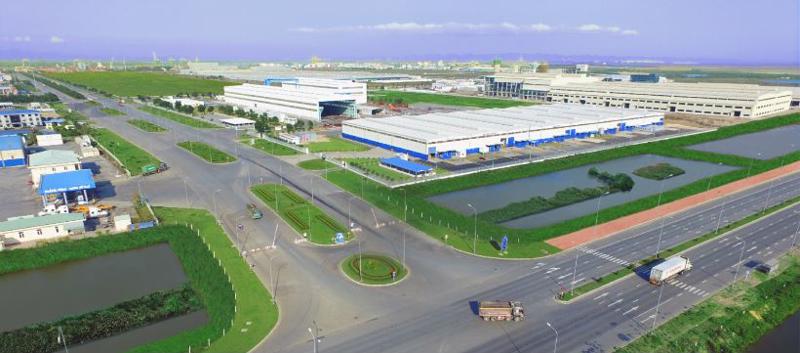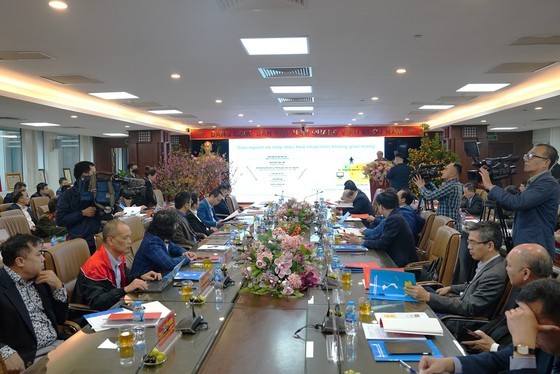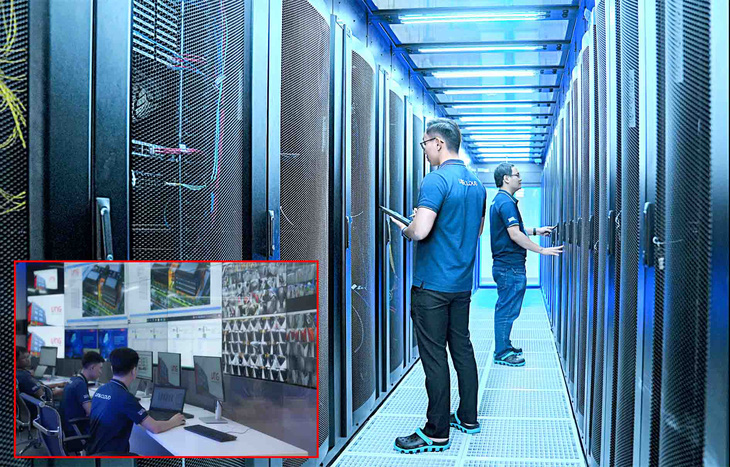Converting to an eco-industrial park, need preferential policies and incentives
The transformation towards a green economy and a circular economy in industrial parks and economic zones is a key factor to improve competitiveness and ensure sustainable development for each industrial park and economic zone as well as for each locality and the whole economy…

Speaking at the Seminar “Developing eco-industrial parks in Vietnam: Policies and solutions for implementation” organized by the Ministry of Planning and Investment in collaboration with the United Nations Industrial Organization (UNIDO) on 15/02 9, Deputy Minister of Planning and Investment Nguyen Thi Bich Ngoc said that the green economy and circular economy have been identified as one of the directions and tasks in the 10-year socio-economic development strategy in 2021. 2020.
“New mechanisms and policies have been recently promulgated/approved by the Government and the Prime Minister such as Decree No. 35/2022/ND-CP on the management of industrial parks and ecological zones, in which regulations on eco-industrial park model; Project on Development of Circular Economy in Vietnam; The National Green Growth Strategy for the period of 2021-2030, a vision to 2050 and the National Green Growth Action Plan for the period of 2021-2030… have demonstrated Vietnam’s aspiration towards a developed country. sustainable development”, emphasized the Deputy Minister.
50% OF LOCALS HAVE PLAN TO CHANGE TO ECO INDUSTRIAL PARK
During more than 30 years of establishment and development, industrial parks and economic zones have made great contributions to Vietnam’s socio-economic development achievements, including the growth of the scale of the economy. economy, create jobs, improve competitiveness and income, accelerate the process of industrialization, modernization, and technological innovation, promote integration, and improve Vietnam’s position in the value chain Global.
However, industrial parks, economic zones as well as the whole economy also face many challenges. The development of industrial parks and economic zones in breadth faces difficulties because the resources of labor, land, and natural resources have expired, while labor productivity and efficiency in resource exploitation are not high; harmonization between economic development and environmental protection and social security has not yet been ensured; tax and land incentives are on a decreasing trend; linkage and cooperation in industrial production in industrial parks and economic zones is still limited.
Therefore, the development of industrial parks and economic zones needs new models with appropriate mechanisms and policies to improve land use efficiency, attract investment and take advantage of the Industrial Revolution. 4.0″, Deputy Minister Nguyen Thi Bich Ngoc stated.
Also according to the Deputy Minister of Planning and Investment, in the 30-year summary report on the development of industrial parks and economic zones of the Ministry of Planning and Investment, which has been approved by the Government, by 2030 there will be 40-50 % of localities have plans to convert existing industrial parks into eco-industrial parks and 8% to 10% of localities have orientations to build new eco-industrial parks from the stage of construction planning and industry orientation investment attraction profession.
Moreover, with 403 industrial parks in operation, promoting the development of industrial parks in the direction of ecology will mobilize large resources from the private sector for green industrial solutions, ensuring energy security, making a significant contribution to Vietnam’s efforts to respond to climate change, promoting green growth and circular economy, demonstrating the political determination of the Government of Vietnam in implementing its commitments to sustainable development. steady.
CHOOSE 3 US INDUSTRIAL PARK
Accordingly, it is expected that from 2020 to 2023, the Swiss Government will continue to support 3 industrial parks in Ho Chi Minh City, Hai Phong, and Dong Nai to convert to an ecological industrial park model according to the international framework, to then replicate this model across the country.
From the perspective of UNIDO, Ms. Le Thi Thanh Thao, Chief Representative of UNIDO in Vietnam highly appreciated the orientation and special attention of the Vietnamese Government in developing eco-industrial parks in line with economic development. sustainable economic and industrial development in Vietnam through the orientation of the Vietnamese Government on green growth and sustainable development, in-depth economic development, reduction of greenhouse gas emissions, and environmental protection.
“In which, it can be said that the eco-industrial park model is a concrete demonstration of these correct policy directions,” emphasized Ms. Thao.
Deputy Minister Nguyen Thi Bich Ngoc speaking at the Conference.
Regarding the important role of the private sector in accelerating the transformation of traditional industrial zones into eco-industrial parks in Vietnam, Mr. Werner Bardill, Consul General, Consulate General of Switzerland in Ho Chi Minh emphasized that at the industrial zone and enterprise level, many enterprises have pioneered in investing and implementing solutions for efficient use of resources and cleaner production.
“We hope that more and more industrial parks in Vietnam will participate in this transition towards sustainable development and competitiveness in the coming time,” said Mr. Werner.
However, according to Deputy Minister Nguyen Thi Bich Ngoc, the eco-industrial park model can only really play a positive role in the country’s sustainable development strategy when it is replicated across the country, with local support. support policy, technology, finance, information, and close connection mechanism between domestic agencies and international organizations.
Accordingly, there should be more guidance on technical regulations and standards from Ministries and sectors and technical guidance from domestic and international experts, especially for industrial symbiosis networks and solutions. circular economy.
“In addition, the addition of financial incentives for industrial parks, ecological zones, and eco-enterprises such as tax exemption and reduction, land rent, priority in credit loans, etc., is necessary to encourage incentives. encourage enterprises to carry out the transformation and new construction of eco-industrial parks by themselves,” recommended the Deputy Minister of Planning and Investment.
More than 72 enterprises have implemented more than 900 energy-saving and cleaner production solutions, saving 76 billion VND/year and mobilizing about 207 billion VND from the private sector, saving 32 Kilo tons of gas CO2 every year, initially bringing about economic, social, and environmental benefits.
Source: VnEconomy




